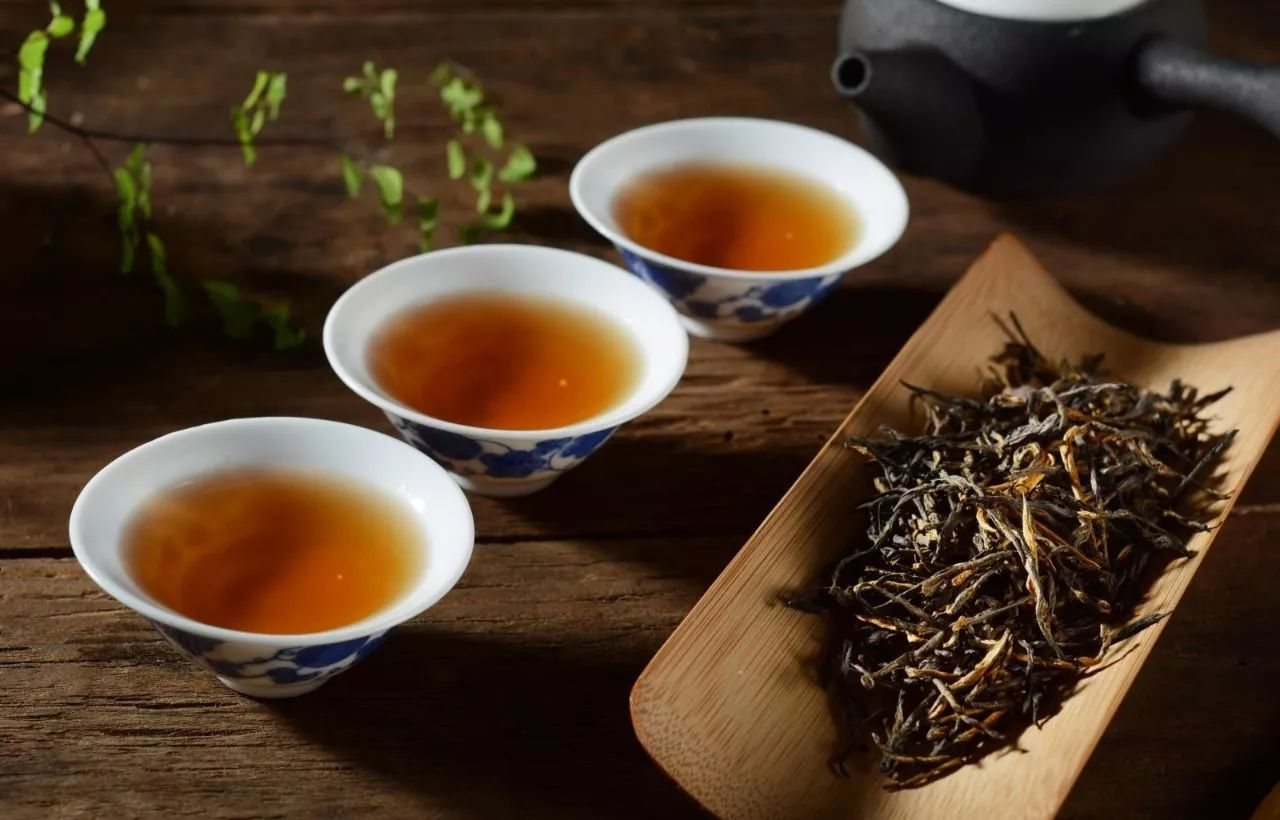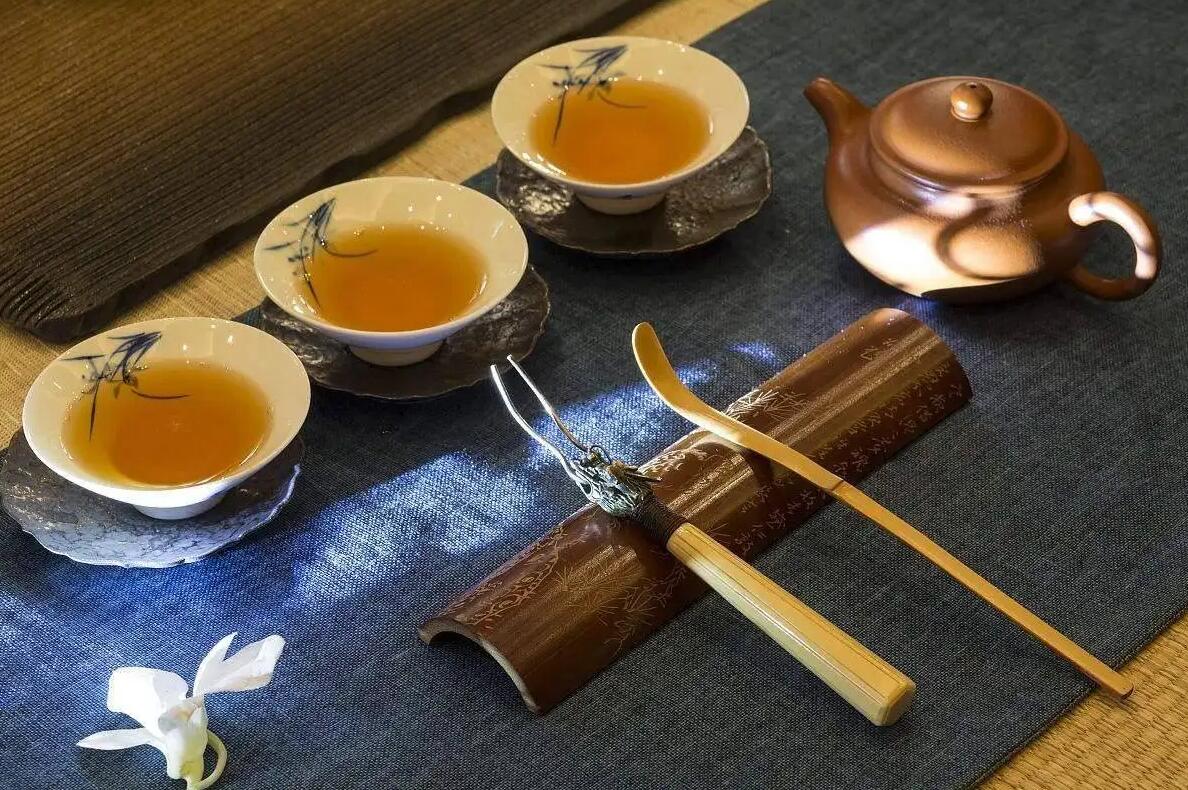"Truth" originally was originally a Buddhist term, which meant real principles The "Four Truths" is the basic spirit of the Chinese Tea Ceremony. The "Four Truths" of the Japanese Tea Ceremony is "harmony, respect, clearness and tranquility". China is the cradle land of the Tea Ceremony, but how do we generalize the Chinese one? Chinese scholars have different opinions about the basic spirit of the Tea Ceremony, two of which are quite representative.
The first proposal of what the"Four Truths" could be was made by Professor Zhuang Wanfang from the Zhejiang Agriculture University, advising that to should be "Honesty, Elegance, Harmony and Respect".
The second proposal was brought forward by Zhang Tianfu that they should be "Frugality, Clarity, Harmony and Tranquility".
Those proposals are quite meaningful. But as foundation of a science, l that the theoretical system should consist of four parts: the philosophic basics, way to practice, the experiences obtained and the ultimate goal. My conclusion that the "Four Truths" are "Harmony, Tranquility, Pleasure and Genuineness".
"Harmony" The Core Philosophy of the Chinese Tea Ceremony
The Chinese Tea Ceremony is rooted within traditional Chinese culture, which absorbed the philosophical ideas from the Confucianism, Buddhistm and Taoism. These make the concept of "Harmony so profound and impressive that it actually became a common point within these three religious philosophy.
The idea of "harmonious thought" within the Tea Ceremony was inspired from the concept to "keep the big balance" in the Changes. "Keeping the big balance refers to that the "Harmony" between the Yin and Yang elements which compose everything in the physical world; the Confucianism, Buddhism and Taoism have the same idea about harmony within the Tea Ceremony but have different interpretations.
The Confucians hold a "middle way, idea from the "big balance" concept. In their eyes, "Harmony" means keeping in the middle, being tolerant, proper and appropriated by which everything should be under control in a rational way and not
an emotional one. That is why Lu Yu promoted the disciplined and virtuous action. It firstly emphasizes on the relationship between nature and humanity - to protect nature, to be close to the nature. Secondly, the relationship between human in the society should be conducted by being polite and showing respect to each other and assisting each other.
The Confucian interpretation of "Harmony" is thoroughly revealed in the Tea Ceremony, which includes: the proper control of the quantity of tea to brew, the politeness and courtesy to show and treat guests, the elegance behavior and appreciative actions that the guests show and the simple and honest style of the performance of art in making tea or tea art when conducting the Tea Ceremony.
The Taoists have another view on "Harmony". LaoZi thought that everything in the world was composed of two elements Yin and Yang shows that they rely on each other whilst being comparatively independent, but m the end they both belong to Nature. That is why Taoism cares so much about closing and paying respect to nature, by which they use this to guide their daily lives to get along with the other members within society.
The Taoists also have a theory about how to keep in good health via the philosophical idea of "Harmony", by which they think that tea is a substance containing the five elements and keeping the balance amongst them. Lao Zi said that "humanity should follow the rules of Nature, not to stick to the routines, not to be lured by others and keep propriety". The tea ceremony emphasizes the freedom and comfort of individual life experience. Savouring tea is a process that should be just enjoyed to savour the pleasure and happiness through the art and aesthetic experience thus keeping a balance within body and keeping one in good health.
The Buddhists talk about "Harmony" as well, like the idea of the "middle way leading to a nice result . The script of Za A Han says, "people should study equality, not be over dedicated, nor be too relaxed", which is a harmonious idea. There are six guidelines in the practice of Buddhism which are to "respect the same views; discuss and study if they have different opinions; physical harmony helps to get along with others; nice words create peace; the same pleasures can be enjoyed and same interests can be shared".
The most outstanding example is "Tea and Zen Affinity" in the Tea Ceremony The Tea Ceremony is a domestic culture but the Buddhist faith was imported. The mixture of the two is a new harmonious culture called Tea and Zen Affinity", could be appreciated by both monks and ordinary people.
It was just because the profound meanings contained within the character "Harmony"that so many people take it as the soul of the Tea Ceremony and the attitude of tea scholars.
"Tranquility" - The Initial Practices of the Chinese Tea Ceremony
The Chinese Tea Ceremony is an essential way to cultivate people's personalities thoughts and individuality.
Lao Zi said that to "keep a tranquil heart means that you could see the everything again. The vast amount of things all would go to their destinations. process is called tranquility." Zhuang Zi said that "the peaceful surface of the water reflects the details, which should be the inspiration of the intelligent, should be the same. The Sages' hearts are peaceful, reflecting on everything in the world." The principle implied by both of them is called the "peaceful eye views the whole", which is way to view human's life, to view humans themselves and to gain the wisdom of life.
The thought of "tranquility and following Nature" in Taoism has an apparent affection on Traditional Chinese Culture and the psycological structures of ethnic group. Scholars from different Dynasties all took "Tranquility" as a key to practice their philosophy and thoughts. Like Wang Wei, Bai Juja and Su Dongpo they were trying to view their own personality and nature as human beings and looking for their independent pride through "Tranquility".
Tranquility is advocated by the Taoists, Confucians as well as by the Buddhists. We frequently mentioned about how "Tea and Zen Affinity", Zen (Dhyana in Sanskrit) in Chinese means "think peacefully, which is concentrating, focusing on thinking and Buddhism studies. "Jie, Ding, Hui" are the three essential practices in order to study, in which Jie means to abstain from doing bad things and bad habits; Hui means through practice and to study to gain wisdom; Ding is peace, the necessary path to reach the goal.
The Master Da Mo was thinking peacefully that in front of a wall for nine years was a sample of "Tranquility". A Modem Master Hong Yi has an excellent explanation about what is "Tranquility", he said if you "abstain from the outside world, the heart will not be lured by materials". This is called "Tranquility".
The Taoist, Buddhists and Confucian are in an ultimate conjunction within the Tea Ceremony, in which their requirement is that "tea needs to be peacefully savoured". Aesthetically, the Chinese Tea Ceremony takes "Tranquility" not only as a basic, but as beauty as well. Lin Bu, famous for his remarks I take cherry as my wife and crane as my son, wrote a poem as follows:
White clouds and the new Southern Peak Tea, how green the tea leaves are and how fresh the flavour is during the Guyu Festival Trying it alone just like the snow on the lake, drinking it with company as we think of the people in Chan together.
In his poem, he describes the tranquility of heart.
Liu Zongyuan, a key literary figure in the Tang Dynasty, wrote the article Occasional Writing during a Summer Day saying:
The summer in the Southern state feels muggy like being drunk, I took a good sleep after opening the North window.
Waking up at noon and hearing nothing but the children playing with the tea utensils.
What he wrote was about the "Tranquility of the environment.
Cai Xiang, among the top four calligraphers in the Song Dynasty Savouring Tea:
Seeing off friends on the boat of the lake, coming home at night by the red candles near the river.
Today I sit in the hall alone facing the hill, enjoying the tea brewing like snow.
What he wrote was about the "Tranquility" of people.
heng Yuanhuang, in the Song Dynasty, wrote Cold Evening:
Serving tea as if it were wine when friends are coming upon a cold night, the water is just boiling on the stove.
The same moonlight as usual before the window, but is distinguished by the plum blossom.
He wrote about the "Tranquility" of the evening.
Zheng Banqiao wrote the Description of the Painting:
No rain nor wind which is just right, the green bamboo grows straight.
Friends coming when the evening is cool, which is my favourite way to drink fresh tea together.
This poem described not only about "Tranquility", but also about the movement moving a perfect match.
Nearly everyone takes "Tranquility" as the essential path to reach their goal no matter whether you be a scholar or a monk. Because "Tranquility" can help you embrace more and observe more. The Taoists say "tranquility can make you know everything to enjoy a natural happiness", while the Confucians say "tranquility could lead to a virtuous life". Hence, "Tranquility" is the only way tp get there.
"Pleasure" - The Organoleptic Tasting of Practicing the Chinese Tea Ceremony
"pleasure", which means happiness, is the ultimate goal of the Chinese Tea Ceremony which is aimed for by people. "Pleasure" consists of three different levels:
The first level is the organic experience. In practicing Tea Ceremony, the first thing to consider is the direct feelings of everything, like the environment, the utensils, the aroma, and perhaps even the music and interpretation. But it is the most basic level as well, for example Cui Yu wrote a poem entitled The Beauty Savouring Tea, which describes "red lips sipping tea, and the throat must be so pleased". Wang Yucheng in the Song Dynasty wrote "the aroma smells like flower and it looks like the moon" from The Dragon and Phoenix Tea.
The second level is the aesthetic experience of "Pleasure".
It is more than the organic experiences of the aesthetic appreciation of the Tea Ceremony. The imagination and satisfaction of the tea ceremony would be delightful as well. Master Ling Yi in the Tang Dynasty had wrote a poem to describe this environmental delight, "spring water and stove fire under the clouds, I am drinking aromatic tea and enjoying the mountain scenery, the boat in the water reluctant to leave, because it is such a pretty river."
Huang Tingjian in the Song Dynasty wrote Tea Poem in Savouring Order that tasty and aromatic, enjoying dreams of home, just like meeting an old friend in the light, can not be described, but be really delighted which describes a sort of feeling and emotion that could only be felt but not described by words.
The third level is the sublimation of the spirit of a pleased mind.
This is at the top level of the Chinese Tea Ceremony that amuses people, and for that, the reason is so appealing. The "pleased mind" refers to the joys and psycological movements throughout tea activities. The sublimation of spirit results in the comfortableness and pleasure of a natural temper. Wen Tingyun's poem Xiling Master's Tea Poem in the Tang Dynasty and Min Ling's poem Savouring the Wuyi Tea in the Ming Dynasty, both describe the same feeling of it.
The "Pleasure" of the Chinese Tea Ceremony applies broadly. people from different backgrounds have different pursuits. For instance, the Upper Classes admire the "precious" tea to show their riches and honor; the scholars admire the "appealing tone" of tea by which to express their wishes; the religious admire the "virtue" of tea to gain truth; the ordinary
people admire the "flavour" of tea, which is more relaxed. This joyfulness that leads up to such personal and individual demands is the special feature that distinguishes the Chinese Tea Ceremony from the Japanese Tea Ceremony.
"Genuineness" -The Starting Point and Ultimate Aim of the Chinese Tea Ceremony
Genuineness was originally a Taoist concept. Zhuang Zi thought that "genuineness", the supreme point of loyalty and honesty, which would not be touched if it is not ample genuine, is from the nature and the nature is not modifiable. Hence the Sages follow the nature and genuineness, but not limited by the conventions". In Taoism, "Genuineness" is Nature, which is the requirement of genuine Taoism and is basically asking for keeping and following Nature. Taoism has a big influence on the Chinese Tea Ceremony. "Genuineness" has four meanings.
The first is the pursuit of the true reality of things. The Chinese Tea Ceremony demands real things in tea activities, which should be real tea, a real environment, real utensils, real paintings and real flowers.
The second is the pursuit of real emotion which is to treat the guests with a full heart, to serve tea sincerely, communicate honestly and make true friends.
The third is the pursuit of real tempers which is to relax yourselves fully whilst savouring the tea. Zhuang Zi said "the genuine Tao should apply in life",which means relieve yourself fully and be yourself.
The fourth is the pursuit of the "Genuine” Tao which is during the tea activities, people should be open-minded, relaxed and at ease to enjoy the tea; feel free to pursue the "Genuineness" of Tao through the mixing of your soul and life with Nature. The aim to comfort the human body and improve the interior world proves that "Genuineness" is the commencement and ultimate goal of the Chinese Tea Ceremony.



